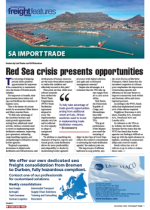The rerouting of shipping around Africa presents opportunities for importers if the connectivity is maintained once the threat of Houthi attacks subsides.For importers to benefit, their governments must reduce red tape and facilitate the reduction of logistics costs. This is the theme of a recent article by economists Céline Bacrot and Marc-Antoine Faure.“To fully take advantage of the maritime business and trade growth opportunities arising from additional vessel arrivals, African countries need to invest in implementing trade facilitation measures, improving port operations, enhancing cargo handling capacity, and strengthening coordination among border agencies. “Regional cooperation, investment in digital trade facilitation and infrastructure, and development of human resources are the main three pillars required to realise this ambition and effectively succeed in this path.”They point out that, while most African countries have ratified the World Tra de Organization ( W TO) Tra de Facilitation Agreement adopted in 2014, “the implementation remains very low and is ref lected in a low capacity to adapt to unexpected changes. “In addition to expediting the clearance of imports, exports and transit goods, trade facilitation allows for more predictability and adaptability to shocks by modernising border agencies’ processes with digital solutions and agile and coordinated management systems."Despite the advantages, it is estimated that the TFA take-up rate ranges from 20 to 79% across Africa. Only Benin, the Democratic Republic of Congo, and Mozambique have fully implemented the T FA .“The good performance of the Maputo port amid the rerouting of ships via the Cape of Good Hope reflects the country’s commitment to advancing the trade facilitation agenda,” the authors point out.The importance of efficient harbours is a top priority, says the 2024 Review of Maritime Transport, which states that the increased congestion in African ports emphasises the importance of increasing capacity and efficiency in the near future to improve connectivity both within and between Africa and extra-regional partners.According to the WTO, South Africa has implemented around 90% of the reforms required.Neighbour Botswana is 95% there, Namibia 67%, Eswatini 87%, Swaziland 40% and Lesotho 26%. In reference to the TFA on its website, the South African Revenue Service states that the WTO has found that border agencies are finding it difficult to keep up with the rapid advances in logistics, resulting in unnecessary delays and costs for traders.South Africa has 10% of reforms to go in order to reduce those costs. ER

